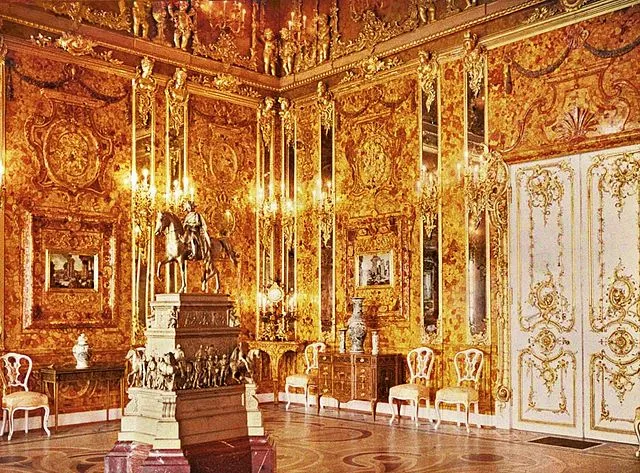FOR centuries, treasure hunters around the world have become obsessed with digging up buried loot, priceless artefacts, and sunken shipwrecks.
Legendary tales and urban myths have led explorers down a treacherous path in search in search for gold and glory.
The Amber Room made of gold leaf and amber was looted during WWII and never seen again
www.areasgrey.comJesse James and his gang of highwaymen are thought to have left buried loot in Oklahoma[/caption]
www.areasgrey.comAn artist’s impression showing Captian Kidd burying hidden treasure looted from other ships[/caption]
From a lost city of vast wealth in the desert to the Inca ransom thought to be worth half a billion dollars hidden deep in a mountain cave.
Treasure hunting expert, Julian Evan-Hart, from Essex, told The Sun why explorers have been so captivated by lost riches.
The 61-year-old said: “I believe it’s just basic human desire to solve mysteries, find something amazing, or just be responsible for finding something that adds to our knowledge.
“Social media has made sharing finds so much easier so others can see the success or failure of treasure hunting ventures.”
Julian added: “Treasure is indeed the fabulous colour films of childhood with their pirate chests spilling open with Spanish Doubloons – it’s almost programmed into us – to go out and find our own thrill, awe, and wonderment.”
The Sun has mapped out some of the world’s most famous lost treasures and takes a deeper look at the myths and legends surrounding them.
Hidden loot of Jesse James
The legend of Jesse James’ £1million hidden loot has left treasure hunters scratching their heads for over a century.
The story goes that Jesse and his gang of highway robbers targeted a mule train carrying a huge amount of gold passing through Oklahoma.
Having ransacked the train, the booty is believed to have been buried somewhere nearby in the town of Cement.
But others say the loot could have been squirrelled away with the gang’s other riches for safekeeping – either to retire on their riches or to support the Confederate cause.
A series of bizarre carvings at a rock formation near the robbery could also be a trial of the buried treasure.
James was born in Clay County, Missouri, in 1847 and along with his brother Frank they ran the James-Younger gang.
Their exploits included robbing banks, stagecoaches and trains across the Midwest specifically targeting Unionists and Union supporters.
The brothers had previously been part of a pro-confederate guerrilla group and would later use the skills they learnt as part of their lives as notorious outlaws.
Treasure hunter and former bull rider Chad Somers says that in 2018 he was sitting on a hillside in rural woodland in Ohio when he claims Jesse James came to him in a dream.
In the dream, he heard the outlaw say: “This is where I’m gonna bury it. This is where I’m gonna bury the biggest treasure I ever buried in my life.”
He believes Jesse was trying to signal exactly where his lost loot was buried and it inspired him to start digging there and then with his bare hands.
He believes that Jesse James was part of a group looking to fund a second civil war and that they could have used a gold mine in Ohio as a front to bury gold.
Ever since Chad has been inspired to search after finding clues on maps that point to the Ohio property and the mark “JJ” on a nearby tree.
Later reports emerged that Jesse had even come to Ohio in 1882 to fake his death adding to the mystery.
Captain Kidd’s lost treasure
Sottish-born William Kidd was branded a pirate after capturing a French ship manned by an English captain.
When Kidd, who had been employed as a privateer for the Crown, caught wind of this he attempted to hand himself into clear his name.
His plea fell on deaf ears and he was tried and eventually executed for murder and piracy in London in 1701.
Before the Scot handed himself in, Kidd revealed the location of buried treasure in Gardiners Island, New York.
When he realised he would not clear his name, he attempted to use the treasure to buy his freedom but the booty was found and used as evidence against him.
But legend has it that more of Captain Kidd’s treasure was left behind in secret locations waiting to be discovered.
After turning to a life of piracy at 35, he joined a French-English pirate crew in the Caribbean before a mutiny made him captain.
Kidd and his crew became pirates for hire for the Governor of Nevis on the agreement that he protect the British colony and in return keep any loot from enemy ships.
Eventually, Kidd married the wealthiest woman in New York and became a pirate hunter before turning back to a life of crime and capturing his biggest prize – the 400-ton Quedagh Merchant.
Laden with precious textiles, gold and silver, Kidd swiped the lot before caching the ship – it was later discovered in 2007 off the coast of the Dominic Republic.
In 1929, pirate relic hunter Hubert Palmer claimed to have purchased Captia Kidd’s furniture with four hand-drawn maps hidden inside.
The location of the maps is currently unknown but they were examined by the British Museum at the time and believed to be genuine.
Atahualpa’s Inca Gold
In the 1850’s British botanist, Richard Spruce found a guide and map that detailed a vast amount of treasure said to have belonged to Inca king Atahualpa.
In 1532 Spanish conquistadors visited the Inca king hoping to claim rights over the land – when he refused the King and his nobles were captured.
He negotiated his release with the Spaniards by agreeing to fill his prison cell with gold and the next two rooms with silver in exchange – believed to be worth half a billion dollars in today’s money.
Fearing the King could spark an uprising he charged him with crimes to set the stage for his execution.
Hearing of his execution, his general is said to have hidden all of the clan’s most precious items in a deep cave in the mountains of Llanganates in Ecuador.
www.areasgrey.comCaptain Kidd was eventually executed for being a pirate before his body publicly hung over the river Thames to deter other criminals[/caption]
www.areasgrey.comKing Atahualpa’s Inca gold was thought to have been hidden in a mountain cave in Ecuador after he was captured by Spanish invaders[/caption]
www.areasgrey.comA golden Inca mask – similar to what could be lost inside the cave[/caption]
SWNS
The Royal Merchant ship is thought to have sunk with £1billion worth of booty on board[/caption]
Hundreds of years later, Spruce claimed to have discovered a map leading to the Inca’s ransom and handwritten directions from a guide, who claims he was led there by the family of his Inca bride.
in 1886, treasure hunter Barth Blake went in search of the treasure and claimed to have found it, writing to a friend that he would bring home what he could as it was too much for one man to carry.
However, Blake mysteriously vanished and never returned home to North America.
Despite many searching for the hidden gems, some even dying in their pursuit, the booty has never been discovered.
Atlantis of the Sands
Legend has it that a lost city laden with treasure lies hidden in the southern desert of the Arabian Peninsula.
The city has come to gain several names – Wabar, Iram of the Pillars, Ubar but most famously named the Atlantis of the Sand by British archaeologist T.E. Lawrence.
Mentioned in the Quran and on ancient tablets, many have interpreted the scripture as describing a lost city of vast wealth until the wicked attracted the wrath of God who destroyed it.
However, the site only gained its legendary status in the 1900s when British diplomat Bertram Thomas was attempting to become the first European to cross the sands.
He was told of the existence of the lost city by his escorts and became aware of T.E. Lawerence’s(Lawrence of Arabia) fascination with the Atlantis of the Sands.
Many years later writer and filmmaker Nicolas Clapp claimed to have discovered the city in Southern Oman but his discovery has since been disputed.
Is the lost city of treasure still buried beneath the sands?
The Merchant Royal
Known as the “El Dorado the Sea”, the English ship the Merchant Royal sank off the coast of Cornwall leaving behind an incredible amount of riches.
The precious ship along with its cargo has never been seen since its untimely demise.
The actual price of the mysterious wreckage varies in amounts as no one has ever really seen what lies within the ship.
Figures range from around £20billion to £250million but most people use £1billion as a ballpark amount.
On board at the time of its sinking is thought to be 100,000 lbs of gold, 400 bars of Mexican silver and almost 500,000 ‘pieces of eight’, or Spanish dollars.
As well as the crews personal goods there would’ve been gold, money and other valuable pieces left to rust.
While docked in Cadiz on a normal trading journey, the captain of the Merchant saw a ship set on fire and realised he had a great opportunity to get even more treasure on board.
He offered to carry the goods to Antwerp for the Spanish as they went past England to make a little extra money.
The extra cargo and longer route proved disastrous as dodgy leaks started to appear.
On its final ever journey the ship’s hull started gushing with water as more leaks broke loose.
With rough and stormy seas and poor pumps, the ship took on more and more water until the mega vessel sank in 1641.
It’s believed that almost all of the valuable treasure was left and has been untouched in the 382 years since.
The Amber Room
The Russian Amber Room thought to be worth around £250million has captivated treasure hunters for years after it was looted by soldiers during WWII.
The Amber Room, a room covered in amber and gold leaf from floor to ceiling, was first created in 1701 for the second wife of Fredrick 1st King of Prussia.
It was first constructed in Berlin City Palace before it was gifted to Fredrick William I and moved to Russia.
The stunning gold room took ten years to complete and covered 590 square feet, containing 13,000lbs of amber.
When Hitler’s German forces invaded the Soviet Union the room was covered in wallpaper in an attempt to hide it from looters.
Nazi troops saw through the disguise and the room was completely dismantled in 36 hours – being moved to the Kronigsberg Castle.
Hitler ordered all valuables to be moved from the castle as Allied forces carried out air raids but the Amber Room had completely vanished by the end of the war.
www.areasgrey.comRuins believed to be the Atlantis of the Sands – but no one has been able to confirm its discovery[/caption]
www.areasgrey.comA hand-written map by British diplomat and soldier Bertram Thomas said to reveal the lost city’s location[/caption]
www.areasgrey.comThe city was dubbed the Atlantis of the Sands by famous British archaeologist T.E. Lawrence[/caption]
Leave a comment








